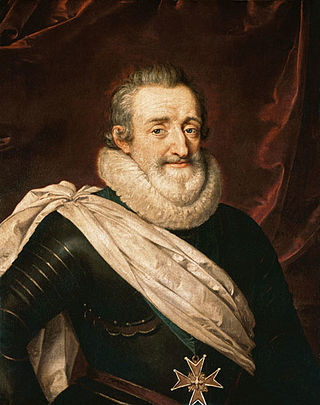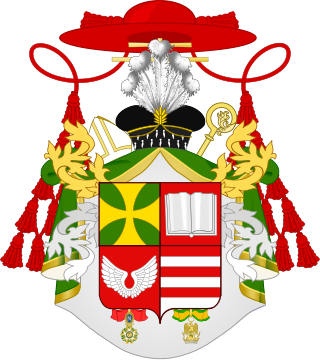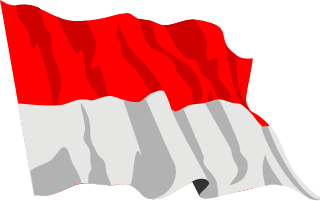
The Edict of Nantes was signed in April 1598 by King Henry IV and granted the minority Calvinist Protestants of France, also known as Huguenots, substantial rights in the nation, which was predominantly Catholic.

The political history of France covers the history of political movements and systems of government in the nation of France, from the earliest stages of the history of France until the present day. This political history might be considered to start with the formation of the Kingdom of France, and continue until the present day.

Pope Pius VII was head of the Catholic Church from 14 March 1800 to his death in August 1823. He ruled the Papal States from June 1800 to 17 May 1809 and again from 1814 to his death. Chiaramonti was also a monk of the Order of Saint Benedict in addition to being a well-known theologian and bishop.

Napoleon Bonaparte, later known by his regnal name Napoleon I, was a French military officer and statesman who rose to prominence during the French Revolution and led a series of successful campaigns across Europe during the French Revolutionary and Napoleonic Wars from 1796 to 1815. He was the leader of the French Republic as First Consul from 1799 to 1804, then of the French Empire as Emperor of the French from 1804 to 1814, and briefly again in 1815.

The Concordat of 1801 was an agreement between the First French Republic and the Holy See, signed by First Consul Napoleon Bonaparte and Pope Pius VII on 15 July 1801 in Paris. It remained in effect until 1905, except in Alsace–Lorraine, where it remains in force. It sought national reconciliation between the French Revolution and Catholics and solidified the Roman Catholic Church as the majority church of France, with most of its civil status restored. This resolved the hostility of devout French Catholics against the revolutionary state. It did not restore the vast Church lands and endowments that had been seized during the Revolution and sold off. Catholic clergy returned from exile, or from hiding, and resumed their traditional positions in their traditional churches. Very few parishes continued to employ the priests who had accepted the Civil Constitution of the Clergy of the revolutionary regime. While the Concordat restored much power to the papacy, the balance of church-state relations tilted firmly in Bonaparte's favour. He selected the bishops and supervised church finances.

Joseph Cardinal Fesch, Prince of the Empire was a French priest and diplomat, who was the maternal half-uncle of Napoleon Bonaparte. In the wake of his nephew, he became Archbishop of Lyon and cardinal. He was also one of the most famous art collectors of his period, remembered for having established the Musée Fesch in Ajaccio, which remains one of the most important Napoleonic collections of art.

The Consulate was the top-level government of the First French Republic from the fall of the Directory in the coup of 18 Brumaire on 9 November 1799 until the start of the French Empire on 18 May 1804. By extension, the term The Consulate also refers to this period of French history.

The French Catholic Church, or Catholic Church in France is part of the worldwide Catholic Church in communion with the Pope in Rome. Established in the 2nd century in unbroken communion with the bishop of Rome, it was sometimes called the "eldest daughter of the church".
Vehementer Nos was a papal encyclical promulgated by Pope Pius X on 11 February 1906. He denounced the French law on the Separation of the Churches and the State enacted two months earlier. He condemned its unilateral abrogation of the Concordat of 1801 between Napoleon I and Pope Pius VII that had granted the Catholic Church a distinctive status and established a working relationship between the French government and the Holy See. The title of the document is taken from its opening words in Latin, which mean "We with vehemence".

Giovanni Battista Caprara Montecuccoli was an Italian statesman and cardinal and archbishop of Milan from 1802 to 1810. As a papal diplomat he served in the embassies in Cologne, Lausanne, and Vienna. As Legate of Pius VII in France, he implemented the Concordat of 1801, and negotiated with the Emperor Napoleon over the matter of appointments to the restored hierarchy in France. He crowned Napoleon as King of Italy in Milan in 1805.

Religion in France is diverse, with the largest religion group being Christianity. A very significant part of the population is not religious, and significant minorities profess Islam and other religions. Freedom of religion and freedom of thought are warranted by the legacy of the 1789 Declaration of the Rights of Man and of the Citizen, and by the principle of laïcité enforced by the 1880s Jules Ferry laws and the 1905 law on the Separation of the Churches and the State. Roman Catholicism was the major religion in the real of the French monarchy for more than a millennium, and it also held the role of state religion; the monarchy had such close ties to the Roman papacy that France was called the "eldest daughter of the Church".

The Kingdom of France is the historiographical name or umbrella term given to various political entities of France in the medieval and early modern period. It was one of the most powerful states in Europe from the High Middle Ages to 1848 during its dissolution. It was also an early colonial power, with colonies in Asia and Africa, and the largest being New France in North America centred around the Great Lakes.

The Reformed Church of France was the main Protestant denomination in France with a Calvinist orientation that could be traced back directly to John Calvin. In 2013, the Church merged with the Evangelical Lutheran Church in France to form the United Protestant Church of France.

The Organic Articles was a law administering public worship in France.

Christianity in France is the largest religion in the country. France is home to The Taizé Community, an ecumenical Christian monastic fraternity in Taizé, Saône-et-Loire, Burgundy. With a focus on youth, it has become one of the world's most important sites of Christian pilgrimage with over 100,000 young people from around the world converging each year for prayer, Bible study, sharing, and communal work.

The Diocese of La Rochelle and Saintes is a Latin Church diocese of the Catholic Church in France. The diocese comprises the département of Charente-Maritime and the French overseas collectivity of Saint-Pierre and Miquelon. The bishop is a suffragan of the Archbishop of Poitiers. The episcopal seat is in La Rochelle Cathedral. Saintes Cathedral is a co-cathedral.

The history of the Catholic Church in France is inseparable from the history of France, and should be analyzed in its peculiar relationship with the State, with which it was progressively confused, confronted, and separated.

The Concordat in Alsace-Moselle is the part of the local law in Alsace-Moselle relating to the official status accorded to certain religions in these territories.

The history of secularism in France is the birth and development of this principle up to the present day.
The Imperial Catechism was established in 1806 by Napoleon I to replace the diocesan catechisms throughout the Empire.



















